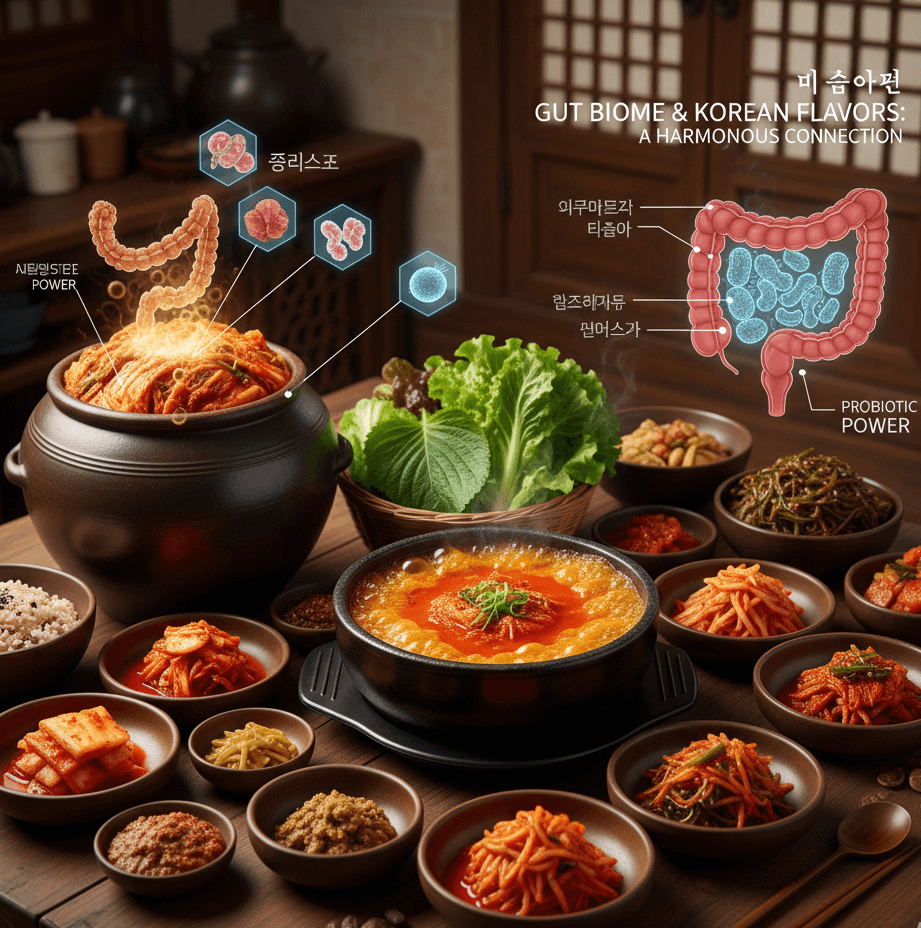The relationship between gut health and Korean cuisine runs deep, blending traditional wisdom with modern science. While the gut is often called the “second brain”, its importance goes far beyond digestion—it affects immunity, mood, and even energy levels. Interestingly, Korean food has supported gut balance for centuries through its use of fermented foods, fresh vegetables, and balanced meals.
🧠 What Is Gut Health?
Your gut microbiome is made up of trillions of microorganisms that live in your digestive tract. A healthy gut helps with:
➡️ Digesting food efficiently and absorbing nutrients
➡️ Boosting the immune system
➡️ Balancing mood and mental health through the gut-brain connection
➡️ Preventing inflammation and chronic diseases
When bad bacteria outnumber the good ones, you might experience bloating, fatigue, mood swings, or weakened immunity. That’s why maintaining gut balance through food is crucial.
🥢 Why Korean Cuisine Supports Gut Health
Korean cuisine naturally promotes a healthy gut ecosystem. Traditional meals are:
➡️ Fermentation-rich – foods like kimchi and doenjang are packed with probiotics
➡️ Plant-focused – vegetables, seaweed, and grains provide essential fiber and prebiotics
➡️ Balanced – every meal includes rice, soup, and side dishes (banchan) that cover nutrients from all groups
Koreans have been eating for gut health long before “probiotics” became a trend.
🌶️ Kimchi: Korea’s Probiotic Superfood
Kimchi is the most famous Korean fermented dish and one of the best foods for gut health. It’s made with napa cabbage, radish, garlic, ginger, and chili powder—then naturally fermented.
➡️ Rich in probiotics like Lactobacillus, which balance gut bacteria
➡️ Boosts immunity and helps reduce inflammation
➡️ Supports digestion and nutrient absorption
➡️ Contains antioxidants that promote detoxification
Regularly eating kimchi can:
➡️ Improve digestion and reduce bloating
➡️ Enhance metabolism and support weight control
➡️ Strengthen immune function
Tip: Add kimchi to rice, soups, or pancakes to enjoy its health benefits in various forms.
🥣 Other Gut-Friendly Korean Fermented Foods
Besides kimchi, Korea has many fermented treasures that nourish the gut:
➡️ Doenjang (fermented soybean paste) – used in soups; rich in probiotics and amino acids.
➡️ Gochujang (fermented chili paste) – adds depth to dishes and supports digestion.
➡️ Makgeolli (rice wine) – contains lactic acid bacteria and yeasts beneficial for gut balance.
➡️ Jeotgal (fermented seafood) – provides umami flavor and natural probiotics.
These foods prove that Korean cuisine has been practicing natural microbiome care for generations.
🥗 The Harmony of a Korean Meal
A typical Korean meal includes rice, soup, and several side dishes (banchan). This creates perfect nutritional balance.
➡️ Vegetables provide fiber and prebiotics (food for good bacteria).
➡️ Fermented pastes and sauces offer probiotics.
➡️ Rice and grains supply energy for daily function.
➡️ Soups and stews keep digestion smooth and hydrated.
Koreans believe in the yin-yang philosophy of food—balancing warm and cool elements, spicy and mild flavors, cooked and raw textures—to maintain overall harmony in the body.
🔬 Modern Science Confirms Korean Wisdom
Recent studies in Korea and abroad show that fermented foods enhance gut microbiome diversity and improve health markers.
➡️ People who eat kimchi daily show lower inflammation and better digestion.
➡️ Fermented soybean products like doenjang contain anti-inflammatory compounds and beneficial enzymes.
➡️ Probiotic foods are linked to better mood regulation and stronger immunity.
This scientific validation highlights that Korean food traditions were ahead of their time.
💡 Tips to Improve Gut Health with Korean Foods
You can easily incorporate Korean dietary habits into your daily life:
➡️ Eat kimchi regularly – start with a few spoonfuls per meal.
➡️ Use doenjang or gochujang instead of processed sauces.
➡️ Add more fiber – include vegetables like spinach, bean sprouts, or mushrooms.
➡️ Try homemade fermentation – make your own kimchi or pickled radish.
➡️ Avoid too much sugar or processed food, which can harm gut bacteria.
➡️ Drink enough water and herbal teas – hydration supports healthy digestion.
Pro tip: A small portion of fermented food daily can do more for your gut than expensive supplements.
🧋 Modern Korea’s Gut-Health Revolution
Korea continues to innovate in health and wellness. Today, you’ll find:
➡️ Probiotic yogurts and drinks inspired by traditional fermentation.
➡️ Kombucha cafés in cities like Seoul, offering tea-based probiotics.
➡️ Functional skincare products promoting “beauty from the gut.”
➡️ Research centers exploring gut-brain health through Korean diet science.
These trends show that Korea blends tradition with technology to promote whole-body wellness.
🌿 Final Thoughts
The link between gut health and Korean cuisine is a perfect example of how ancient traditions align with modern wellness. Korean food is more than flavorful—it’s functional.
➡️ Fermented foods like kimchi, doenjang, and gochujang feed your gut with beneficial bacteria.
➡️ Balanced meals ensure prebiotics, probiotics, and nutrients work together.
➡️ Regular consumption helps digestion, immunity, and even mood.













